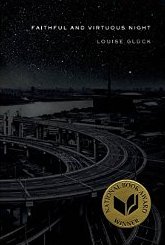It is late afternoon. You enter the movie theater. You walk through the lobby to the auditorium. There, the late afternoon becomes night. You find a good seat. You see the previews of coming attractions, and the command to silence your mobile device. You wait. The movie begins. It is French. Black-and-white images flicker. A story unfolds across the screen.
Reading Faithful and Virtuous Night by Louise Gluck is like that movie experience. Each poem is a film, or a film script for the eye. Consider “the Past, ” one of the shorter of the 24 poems occupying 81 pages:
Small light in the sky appearing
suddenly between
two pine boughs, their fine needles
now etched onto the radiant surface
and above this
high, feathery heaven—
Smell the air. That is the smell of the white pine,
most intense when the wind blows through it
and the sound it makes equally strange,
like the sound of the wind in a movie—
Shadows moving. The ropes
making the sound they make. What you hear now
will be the sound of the nightingale, chordata,
the male bird courting the female—
The ropes shift. The hammock
sways in the wind, tied
firmly between two pine trees.
Smell the air. That is the smell of the white pine.
It is my mother’s voice you hear
or is it only the sound the trees make
when the air passes through them
because what sound would it make,
passing through nothing?

The sense of the cinematic frames each of these poems, whether they are about a decision to finish with romantic adventures, visitors from abroad, an old woman sitting in a park and telling a story, visiting a father’s grave, a visit to Cornwall, or an open window. Gluck is filming small, beautiful movies, a few written in the form of prose poems. Her use of the present tense adds to the film quality, and makes each poem seem as if is happening just as you read it.
Gluck is one of America’s leading poets. The author of 16 poetry collections and three non-fiction works, she received the Pulitzer Prize for poetry for The Wild Iris (1992), was named U.S. Poet Laureate in 2003, and has received numerous other awards, prizes and fellowships. Faithful and Virtuous Night was the 2014 National Book Award winner for Poetry:
Faithful and Virtuous Night is an invitation to walk alongside a poet and watch as she aims her camera to capture her scenes and stories. These poems by Louise Gluck leave us with a sense of wonder; they leave us with the beauty of words and images.
Photo by Brian Papantonio, Creative Commons, via Flickr. Post by Glynn Young, author of the novels Dancing Priest and A Light Shining, and Poetry at Work.
Want to brighten your morning coffee?
Subscribe to Every Day Poems and find some beauty in your inbox.
- “Your Accent! You Can’t Be from New Orleans!” - October 9, 2025
- Poets and Poems: Donna Vorreyer and “Unrivered” - October 7, 2025
- Poet Sidney Lanier and the Lost Cause - October 2, 2025



Richard Maxson says
Glynn, thank you for highlighting this marvelous book of poems. I bought Faithful and Virtuous Night a few months ago and am still slowly working my way way through it; which is as you describe like a movie with each poem.
The Wild Iris was my first exposure to a full length, cyclical book of poetry of which the first sentence of the first poem is, “At the end of my suffering/there was a door.”
Working my way through the life deconstructed in Faithful and Virtuous Night is no less an enriching read.
Glynn says
Richard, my own introduction to her poetry was “A Village Life,” one of her later collections (2009). “The Wild Iris is considered one of her best, but I would hard-pressed to figure out which one is her best. Thanks for the comment.
Sandra Wirfel says
Thanx for the way you all highlight poets, it gives me directing into learning about poets that I haven’t followed or read much.
Confession by Louise Gluck
To say I’m without fear–
It wouldn’t be true.
I’m afraid of sickness, humiliation.
Like anyone, I have my dreams.
But I’ve learned to hide them,
To protect myself
From fulfillment: all happiness
Attracts the Fates’ anger.
They are sisters, savages–
In the end they have
No emotion but envy.
I am not very familiar with Louis Glucks poetry, but I have had this poem Confession hanging on my wall for quite a while, it is a constant reminder to me as a poet, to be proud of the emotions that have made me the poet I am, I have spent much of my life protecting myself from criticism on many things, and this poem serves as a reminder that we are all alike, we all have the same emotions, and it’s ok to be afraid and acknowledge that fear.
Thanks for sharing and I look forward to reading more of her work.
Glynn says
Sandra – thanks for reading the post — and for sharing that poem. Poetry is what poets do — and we all share that fear.
Elizabeth Marshall says
Glynn you make introductions to new poets in a way that piques my interest to the point of i may die from the excitement and anticipation of getting my hands on her work. ( best run on sentence eva :))
You are a talented ambassador for poetry.
Glynn says
Elizabeth – thank you!
Megan Willome says
I agree with Elizabeth!
I’ve read more of Gluck’s prose than poetry, but I’ve liked everything of hers I’ve read.
In the poem you chose, when it shifts to the mother’s voice, well, that’s straight out of Cinderella. (To tie in this month’s theme.) As pointed out in “Into the Woods,” Cinderella goes to her mother’s grave by the willow tree to ask for a dress to wear to the festival.
Glynn says
Megan, I would like to say it was my deep insight and close coordination with the TSP theme that led to my selection of that poem. (Pause while I walk over to the corner and whisper: “But that would be wrong.”) Most of the poems in the collection are long, really long. This one was shorter and,f or some reason, one that spoke directly to me. And it may be because I’m fast approaching the one-year anniversary of my mother’s death.
Sandra Heska King says
“The smell of the white pine” … takes me home
Bethany Rohde says
I just read through this and am tearing up here in my kitchen chair. Thank you for writing this post and sharing the poem, Glynn. I was moved by the thought of her mother’s voice and then:
“because what sound would it make,
passing through nothing?”
Now I need to go find more of her poems.
Raghav says
Hi glenn I just wanna ask that their is a line saying ‘what you here is the sound of nightingale, chordata, the male bird courting the female’. What does this line signify?